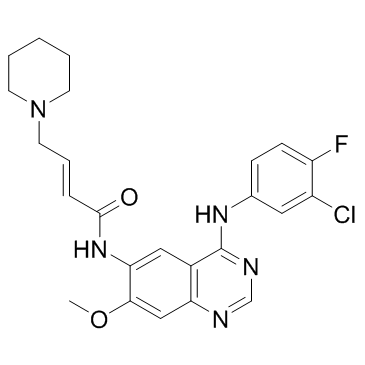| Description |
Dacomitinib is a specific and irreversible inhibitor of the ERBB family of kinases with IC50s of 6 nM, 45.7 nM and 73.7 nM for EGFR, ERBB2, and ERBB4, respectively.
|
| Related Catalog |
|
| Target |
EGFR:6 nM (IC50)
ErbB2:45.7 nM (IC50)
ErbB4:73.7 nM (IC50)
|
| In Vitro |
Dacomitinib (PF00299804) effectively inhibits the in vitro kinase activity of wild-type EGFR (IC50=6 nM)with similar efficacy. Dacomitinib also effectively inhibits wild-type ERBB2 with IC50 of 45.7 nM. In H441, an IC50 is reached with Dacomitinib but only at a very high concentration (4 μM) and likely reflects off-target effects. In cell lines wild-type for both EGFR and K-ras (H322, H1819, and Calu-3), Gefitinib and Dacomitinib both effectively inhibit growth of H1819 and Calu-3 cells but not of H322 cells. Dacomitinib is a pan-ERBB inhibitor and most EGFR mutant cell lines express multiple ERBB family members, the effects on EGFR phosphorylation could potentially be indirect. Dacomitinib inhibits EGFR phosphorylation in all of the different EGFR T790M proteins whereas Gefitinib is ineffective even at 10 μM. In the NIH3T3 cells, phosphorylation of EGFR L858R/T790M is completely inhibited by 1 nM Dacomitinib, whereas 100 nM or greater is required to inhibit EGFR WT/T790M or Del/T790M[1]. The HER2-amplified cell lines are most sensitive to growth inhibition by Dacomitinib (IC50<1 μM in 14 of 16 lines; 87.5%) as compared with 5 of 28 (17.9%) of HER2-nonamplified lines (excluding immortalized lines)[2].
|
| In Vivo |
To evaluate the efficacy of Dacomitinib, xenografts in nu/nu mice are generated using HCC827 GFP and HCC827 Del/T790M cells and treated the mice with Dacomitinib. Dacomitinib (10 mg/kg/d by daily oral gavage) effectively inhibits the growth of HCC827 GFP xenografts. In contrast, HCC827 Del/T790M xenografts are resistant to Gefitinib, whereas Dacomitinib treatment is substantially more effective at inhibiting growth of this xenograft model[1].
|
| Kinase Assay |
The catalytic domains of ERBB1, ERBB2, and ERBB4 tagged with glutathione S-transferase are expressed in insect cells and purified. ELISA-based enzyme assays and IC50 determinations for ERBB1, ERBB2, and ERBB4 are performed. Enzyme assays and IC50 determinations for all other kinases used in this study are performed[1].
|
| Cell Assay |
Cells are seeded in duplicate at 5×103 to 5×104 cells per well in 24-well plates, and growth inhibition data is calculated. Briefly, day after plating, Dacomitinib is added at 10 μM and 2-fold dilutions over 12 concentrations are carried out to generate a dose-response curve. Control wells without the drug are also seeded. The cells are counted on day 1 when the drug is added, as well as after 6 days when the experiment ended. After the trypsinization cells are placed in an Isotone solution and immediately counted using a Coulter Z1 particle counter. The suspension cultures are counted using a Coulter Vi-Cell counter[2].
|
| Animal Admin |
Mice[1] Nude mice (nu/nu; 6-8 weeks old) are used for in vivo studies. Mice are anesthetized using a 2% isoflurane (Baxter) inhalation oxygen mixture. A suspension of 5×106 HCC827-GFP or HCC827-Del/T790M lung cancer cells (in 0.2 mL of PBS) are inoculated s.c. into the lower-right quadrant of the flank of each mouse. Five mice are inoculated with either HCC827-GFP or HCC827-Del/T790M cells in the Gefitinib treatment group. Tumors are measured twice weekly using calipers, and volume is calculated using the following formula: length×width2×0.52. Mice are monitored daily for body weight and general condition. Mice are randomized to treatment when the mean tumor volume is 400 to 500 mm3. Gefitinib is administered at 150 mg/kg/d by daily oral gavage. Dacomitinib is administered at 10 mg/kg/d by daily oral gavage. The experiment is terminated when the mean size of the control tumors reached 2000 mm3.
|
| References |
[1]. Engelman JA, et al. PF00299804, an irreversible pan-ERBB inhibitor, is effective in lung cancer models with EGFR and ERBB2 mutations that are resistant to gefitinib. Cancer Res. 2007 Dec 15;67(24):11924-32. [2]. Kalous O, et al. Dacomitinib (PF-00299804), an irreversible Pan-HER inhibitor, inhibits proliferation of HER2-amplified breast cancer cell lines resistant to trastuzumab and lapatinib. Mol Cancer Ther. 2012 Sep;11(9):1978-87.
|
